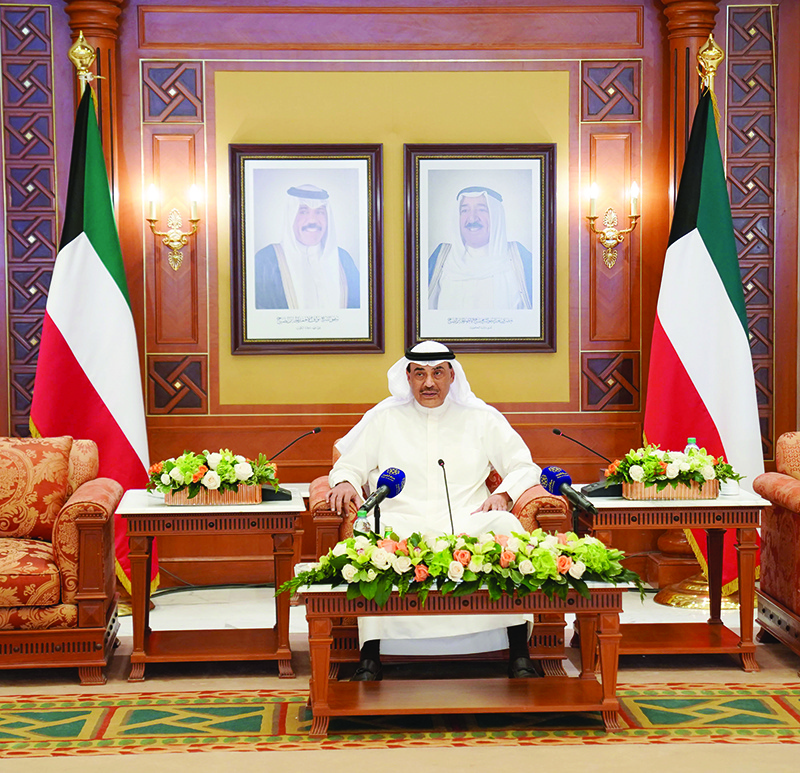
KUWAIT: HH the Prime Minister Sheikh Sabah Al- Khaled Al-Hamad Al-Sabah, accompanied by Minister of Information and Minister of Youth Affairs Mohammad Al-Jabri and Chairman and Director General of Kuwait News Agency (KUNA) Sheikh Mubarak Duaij Al-Sabah, hosted a meeting on Wednesday with editors-in-chief of local newspapers at Seif Palace.
Health situation
The prime minister asserted that the health situation in the country is stable and reassuring, provided that people continue to abide by guidelines. He said “a vaccine for the coronavirus is not yet available, and therefore this disease will continue, but for how long, or how widespread are all subject to speculations “. Sheikh Sabah Al-Khaled explained: “We must adhere to health guidelines and provide all what they need to face the pandemic - those who work in hospitals and intensive care units: Respiratory equipment and protective clothing for medical staff and all those facing danger in all our institutions.”
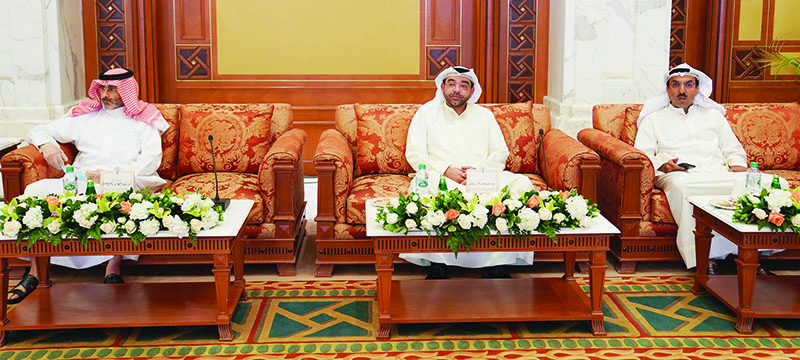
Sheikh Sabah Al-Khaled stated that the challenge is great and enormous, and the determination of the Kuwaiti people is also great, which gives us hope that the continuation of this patriotic spirit, which was manifested in difficult circumstances, will help to overcome this epidemic with the least possible damage. He pointed out the importance of the meeting today, which coincides with the entry of the first phase to return to normal life since the coronavirus crisis started four months ago, adding that we entered the fourth day of the plan to gradually return to life, which will be completed in five stages.
The premier stated that Kuwait, through its financial soundness, ability and network of relationships, has been able to provide all the needs for the country, and to provide the adequate health, pharmaceutical and preventive stocks needed for everyone.
“We must provide everything that citizens and residents need,” Sheikh Sabah Al-Khaled said, pointing out that implementing health guidelines in collaboration with other authorities was a difficult equation, but necessary to work on achieving the result needed. He added that this health crisis placed the whole world in chaos during the past three months and its effects and repercussions extended to all sectors in the world.
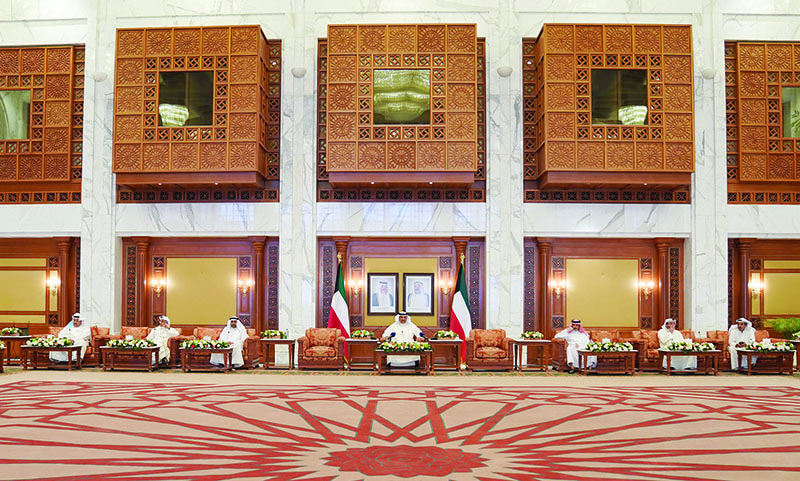
On his meeting with the chief editors of local newspapers, Sheikh Sabah Al-Khaled expressed his happiness at this meeting, pointing out that it was planned, according to his first press meeting as prime minister in the beginning of December, that the frequency of these meetings would be regular, but the current circumstances prevented him from doing what was planned, stressing that this will be compensated in the future.
He reiterated his thanks and appreciation to all those who contributed and volunteered to work, challenging the risks during the past months. Kuwaiti individuals and institutions put their capabilities at the disposal of the government to manage the crisis, which helped us to have multiple options, he said.
The government, at the beginning of the crisis, activated the emergency plan, as 120 beds were allocated for intensive care, and it worked during the last period to increase the capacity of intensive care to 600 beds, “which is five times more than what we had, in addition to equipping hospitals and expanding their wards to receive those infected”.
The premier praised efforts of government agencies, including the oil sector, the Kuwaiti army, the National Guard, and all those who helped build and organize the establishment of field hospitals, expressing at the same time his sincere thanks and appreciation to all government agencies, civil society institutions and the private sector who participated and supported the government in facing the repercussions of this epidemic.
Sheikh Sabah also praised the efforts exerted by employees of the ministry of interior, men and women, for their efforts and hard work during the past three months, in addition to the services provided by the fire department to support various sectors.
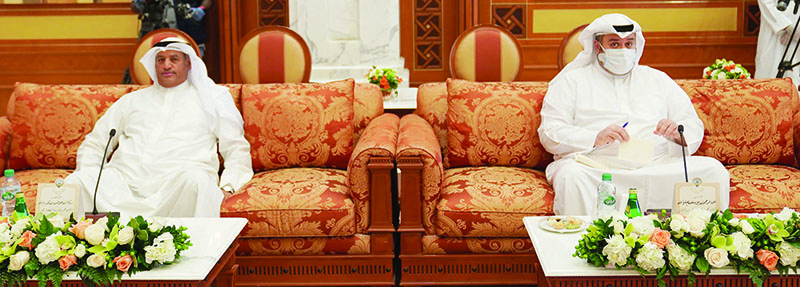
Corrupt individuals
The government is determined to crack down on every individual with relation to corruption cases regarding public funds, money laundering and human trafficking, Sheikh Sabah Al-Khaled affirmed. “We will not stay silent nor keep our hands crossed regarding human trafficking and money laundering, and we will not accept these issues be associated with the State of Kuwait, no matter how influential this person is,” the prime minister underscored.
“No one is immune from prosecution and punishment as long as there is an assault on public funds,” he said. The prime minister said HH the Amir Sheikh Sabah Al-Ahmad Al-Jaber Al-Sabah instructed him, soon after he took oath as prime minister, to protect and preserve public funds and fight corrupt people. He said he considered these instructions a pathway he was pursuing. “Kuwait deserves a good reputation and deserves the title of His Highness the Amir as a ‘humanitarian leader’ and Kuwait as a ‘humanitarian center’. We all have to exert efforts to fight whatever harms the reputation of our nation,” Sheikh Sabah Al-Khaled said.
Asked about the government’s efforts against human traffickers, the prime minister said the government was “fighting human trafficking and all companies that violate the laws, and we have taken legal action against 224 companies and referred them to prosecution”. Asked about the Malaysian sovereign wealth fund and alleged corruption-related charges against Kuwaiti individuals, he said: “We will not be covering up anyone, and no one is immune from prosecution, be it in relation to the Malaysian fund or any suspected abuse of public funds or money laundering or human trafficking. This is a government priority.”
The prime minister said they referred the Malaysian fund issue to the competent authorities for investigation. He said he met former Malaysian Prime Minister Mahathir Mohamad three times when he was foreign minister and he did not mention any “role of Kuwait in this issue”.
Population discrepancy
Kuwait is facing a “big challenge” to address a discrepancy in the structure of the population, Prime Minister Sheikh Sabah Al-Khaled said. Kuwait has a population of some 4.8 million people - of them 1.45 million are Kuwaitis and around 3.34 million are non-Kuwaitis, or a 30 to 70 percent ratio, he said. “The ideal population structure is to have Kuwaitis being 70 percent and non-Kuwaitis 30 percent, so we have a big challenge in the future which is to address the discrepancy in population,” he underscored.
Sheikh Sabah Al-Khaled said there are 750,000 foreign domestic helpers, which equal half of the Kuwaiti population. “The population structure needs time to be resolved, and it should be divided into phases until reaching a final adjustment to the population in future,” he said. “We rely on our sons and daughters to work in all professions,” he added, citing the forefathers who contributed to the building of Kuwait by working in all jobs.
The government, he said, was keen on cooperating with the parliament to reach fruitful results. Asked about resumption of air travel, the prime minister said competent authorities were paving the ground for the resumption of risk-free travel. “The right time will come to open this domain and everybody will be able to travel freely,” he said.
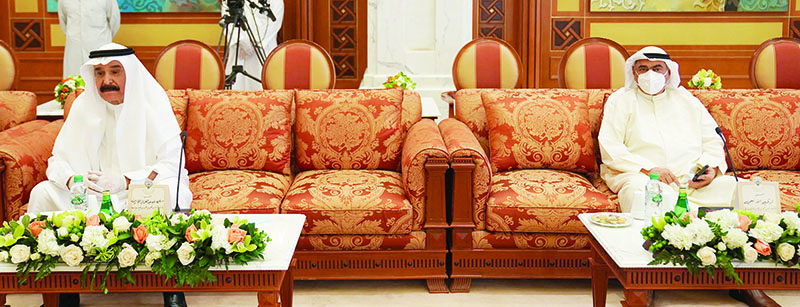
Human traffickers
The prime minister stressed the government’s seriousness in dealing with human traffickers. “We are responsible for every human being on this land; therefore, what happened cost the country’s institutions a lot and affected the country’s demography,” he said. Sheikh Sabah Al-Khaled pointed out that 224 companies were referred to the public prosecution based on information regarding violation of laws and trading of workers. He expressed pride in the people’s cooperation, understanding and appreciation of the government’s efforts in dealing with the coronavirus crisis.
Financial situation
Sheikh Sabah Al-Khaled affirmed that Kuwait’s financial situation is excellent, but the economy needs a major change in its structure. “We cannot rely on one depleted resource, which is oil, because this is difficult, and we must diversify the sources of income in the country,” he said. “The repercussions of the coronavirus caused a huge collapse in oil prices from $65 to $11. Kuwait was investing all of its money and portfolios in world markets, but we had fenders that absorbed shocks as a result of planning to cope with any crisis,” he added.
Rescue package
Sheikh Sabah Al-Khaled said the government adopted a rescue package to address economic ramifications of the novel coronavirus (COVID-19). The package includes bills about public debt and bankruptcy, which aim at preserving many companies and save the jobs of 73,000 Kuwaitis in the private sector, he said. “We should act to mitigate the expected negative effects on the economic situation, and the (pandemic) crisis that has shaken the world and impacted the economy heavily,” he said.
The prime minister called for addressing the economic conditions through a bundle of laws. “We might not need the public debt law today, but later. However, we need laws that precede it in order to lessen the damage caused by the health crisis,” he added. He said the priority now was the health situation, but the government was also focusing on security and economic condi tions, specially of people living in areas under lockdown in Hawally, Khaitan, Farwaniya, Mahboula and Jleeb Al-Shuyoukh.
The government, he added, was working on approving the rescue package “which will decrease the impact and pave way for the next government to focus on the population structure, corruption and unstable economic situation.” Sheikh Sabah Al-Khaled said HH the Amir Sheikh Sabah Al-Ahmad Al-Jaber Al-Sabah’s instructions to honor people working during the pandemic included Kuwaitis and non-Kuwaitis.
Gulf dispute
Sheikh Sabah Al-Khaled affirmed Kuwait’s continuous efforts in resolving the Gulf dispute. The prime minister stressed HH the Amir Sheikh Sabah Al-Ahmad Al-Jaber Al-Sabah’s keenness on the continuation of Gulf joint cooperation. The premier also reminded everyone that he was a foreign minister in the past, and he was close to the efforts exerted by the Amir to end the dispute.
“I am sure that all Gulf states see the path of the Gulf Cooperation Council as important to them and to the region and the world,” the prime minister added. “Unfortunately, we are now in the fourth year of the Gulf dispute, but attempts are still continuing and hopes are greater than they were,” he said. — KUNA
.jpg)


